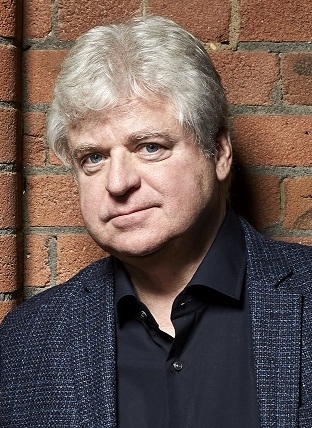Linwood Barclay’s newly released novel, THE LIE MAKER, is a Bookreporter.com Bets On pick. In this twisty, fast-paced thriller, a man desperately tries to track down his father --- who was taken into witness protection years ago --- before his enemies can get to him. As we approach Father’s Day, Linwood reflects on his own father, who helped fuel his love of reading at a young age and never turned him down whenever he asked for a book or any kind of reading material.
 My father was pretty good with what we now refer to, somewhat derisively, as “dad jokes.” When we’d drive past a cemetery, he’d quip, “People are just dying to get in there.” Back when LBJ was in the White House, he’d riddle me, “What do you get if you stick your finger in the President’s ear?” I had no idea. “Johnson’s wax,” he said.
My father was pretty good with what we now refer to, somewhat derisively, as “dad jokes.” When we’d drive past a cemetery, he’d quip, “People are just dying to get in there.” Back when LBJ was in the White House, he’d riddle me, “What do you get if you stick your finger in the President’s ear?” I had no idea. “Johnson’s wax,” he said.
Whenever we were in a grocery store or pharmacy, I scanned those twirling metal book stands for the latest novelizations of my favorite TV shows, or a MAD magazine paperback filled solely with Don Martin cartoons. When I asked my father if he’d buy one for me, he would come back with one of his never-gets-old dad jokes: “You already have a book.”
And then he would give me the money.
When I was nine, Dad took me for the day to the New York World’s Fair. That trip took us through Grand Central Terminal, where I encountered several newsstands selling more comic books than I’d ever seen in my life. I broke free of Dad and ran into every one, finding adventures featuring The Flash and Green Lantern and Superboy and Batman.
Dad bought them all. After all, comics were still reading material, and given that my father was a commercial illustrator in the advertising world, he probably appreciated them for their artwork, too. Money well spent. If Dad ever said no when I asked for any kind of reading material, I don’t remember it.
 And he broadened my interests beyond those TV tie-in books and comics. When I was 15, we’d been watching together “My World and Welcome to It,” a short-lived sitcom based loosely on the life of humorist James Thurber. Dad explained that the magazine the main character, played by William Windom, worked for was based on The New Yorker. At this time, we were living in rural Ontario, as far as you could get from anything New York-like, and you could bet the local supermarket magazine rack didn’t have that particular periodical.
And he broadened my interests beyond those TV tie-in books and comics. When I was 15, we’d been watching together “My World and Welcome to It,” a short-lived sitcom based loosely on the life of humorist James Thurber. Dad explained that the magazine the main character, played by William Windom, worked for was based on The New Yorker. At this time, we were living in rural Ontario, as far as you could get from anything New York-like, and you could bet the local supermarket magazine rack didn’t have that particular periodical.
But Dad must have done some searching because he came home one day with the latest issue of The New Yorker, just for me. I still have it, and for more than 40 years I have been a subscriber. I can thank Dad for the introduction, and I know he’d forgive me for all the times I’ve only gotten to the cartoons.
Around age 10, I started writing stories. Doing them in longhand took forever, so I asked Dad to teach me how to type on our black, manual Royal typewriter that weighed about the same as a Volkswagen. It was the shortest typing lesson in history. “Your fingers are based here in the middle. This finger hits this key, this hits this one, and so on and so on.”
Now I was able to crank out stories in record time, and often Dad would read them. In high school, I wrote a “Twilight Zone”-type tale about a little boy digging a hole in his sandbox that he said went all the way to the other side of the world. Later, when the boy can’t be found, the father investigates that hole, stumbles in and is never seen again. (The boy turns up for supper later.) Dad thought the hole was a metaphor for the father’s anxiety about not being able to find his son. I thought, whoa, did I write something deep here? (Contrast this to the comment my teacher wrote on the story: “I seriously doubt a child could dig a hole this deep.”)
Anyway, fast forward a couple of decades to the late 1980s. My wife, Neetha, a kindergarten teacher, and I always give in when our son, Spencer, or our daughter, Paige, ask for a book. Some things you just don’t say no to.
Dad would have agreed.


